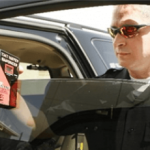OPINION
Per Curiam.
Claimant, Percy Head, appeals as of right the circuit court's judgment of forfeiture of $9,430 in United States Currency, pursuant to MCL 333.7521. We affirm.
On May 12, 2009, Michigan State Trooper Jason Nemecek pulled claimant's vehicle over on I-94 because claimant was following the car ahead of him too closely and had an air freshener hanging from his rearview mirror, possibly obstructing his vision. When Trooper Nemecek approached the car, he smelled burned marijuana. Claimant said there was nothing illegal in the car and gave Trooper Nemecek consent to search it. Trooper Nemecek first ran LEIN checks on claimant and the passenger. The passenger was in violation of parole and Trooper Nemecek took him into custody. Claimant's LEIN check showed he was driving with a suspended license, so Trooper Nemecek arrested claimant. Trooper Nemecek searched the car and saw marijuana stems and seeds on the floor in the front seat and in the back seat. A narcotics canine searched the car but did not give a positive indication for drugs inside the vehicle. Trooper Nemecek then searched claimant pursuant to arrest and found a large amount of money in his pocket. Claimant said it was about $3,000, but it was actually $9,430. At the police station, Trooper Nemecek tested the money and the same narcotics dog alerted to the presence of narcotics on the currency. Trooper Nemecek decided to forfeit the money and a forfeiture trial was held, at which the trial court ruled that forfeiture was proper.
On appeal, claimant asserts the trial court erred in concluding the prosecution established by a preponderance of the evidence that the money should be forfeited. In a forfeiture proceeding, review of the trial court's decision is for clear error. In re Forfeiture of $180,975, 478 Mich 444, 450; 734 NW2d 489 (2007). "A finding is clearly erroneous where, although there is evidence to support it, the reviewing court is firmly convinced that a mistake has been made." Id. "[R]egard shall be given to the special opportunity of the trial court to judge the credibility of the witnesses who appeared before it." MCR 2.613(C); see also In re Forfeiture of $19,250, 209 Mich App 20, 29; 530 NW2d 759 (1995).
Under MCL 333.7521(1)(f), the following property is subject to forfeiture:
Any thing of value that is furnished or intended to be furnished in exchange for a controlled substance, an imitation controlled substance, or other drug in violation of this article that is traceable to an exchange for a controlled substance, an imitation controlled substance, or other drug in violation of this article or that is used or intended to be used to facilitate any violation of this article including, but not limited to, money, negotiable instruments, or securities.
While forfeiture is generally disfavored in the law, Michigan's forfeiture provisions are part of the Public Health Code and, therefore, should be liberally construed to promote the health, safety, and welfare of the citizens of the state. Forfeiture of $19,250, 209 Mich App at 27. "However, the requirements of the forfeiture provisions may be construed strictly to ensure that the due process rights of claimants are protected." Id.
A forfeiture proceeding against property is in rem, and the subject of the proceeding is the property itself, rather than the owner or possessor of the property, who is the claimant. Forfeiture of $180,975, 478 Mich at 450. In an in rem forfeiture proceeding, the party seeking forfeiture has the burden of proof by a preponderance of the evidence. Id. at 458. "Proof by a preponderance of the evidence requires that the factfinder believe that the evidence supporting the existence of the contested fact outweighs the evidence supporting its nonexistence." Blue Cross & Blue Shield of Mich v Governor, 422 Mich 1, 89; 367 NW2d 1 (1985).
To forfeit an asset because it was used, or intended to be used, to effect a violation of the controlled substances act, there must be a substantial connection between the asset and the underlying criminal activity. In re Forfeiture of $5,264, 432 Mich 242, 262; 439 NW2d 246 (1989). The asset need not be traced to a specific sale of drugs, only to drug trafficking generally. In re Forfeiture of $1,159,420, 194 Mich App 134, 147; 486 NW2d 326 (1992). Property with only an "incidental or fortuitous connection" to the underlying criminal activity is not subject to forfeiture. Id. at 146. Whether a claimant can legitimately account for the possession of the asset is a factor considered in making this determination. See id. at 147. However, it is the prosecution's burden to show claimant cannot so account. Id.; Forfeiture of $180,975, 478 Mich at 458 n 19.
Here, there was ample evidence in favor of the trial court's forfeiture decision, including that Trooper Nemecek smelled burned marijuana in the car, Trooper Nemecek saw marijuana stems and seeds in the car, claimant significantly underrepresented the amount of currency he possessed, the currency was wrapped in rubber-bands, claimant was driving a vehicle that did not belong to him, claimant said he was self-employed, the narcotics canine alerted to the presence of narcotics on claimant's currency, and claimant had a prior misdemeanor drug conviction.
This Court has held that "drug profile" evidence is not particularly probative where there is no other convincing evidence indicating a claimant was linked to drug trafficking. In re Forfeiture of $275, 227 Mich App 462, 468; 576 NW2d 431 (1998), rev'd on other grounds 457 Mich 864 (1998). Claimant's use of a third-party vehicle, his self-employed status, his misstatement about the amount of currency he possessed, and the way the money was packaged constituted evidence showing at least part of a "drug profile." However, there is also other persuasive evidence linking claimant to the sale or purchase of drugs, including the smell of marijuana in the car, the seeds and stems in the case seen by Trooper Nemecek, and the narcotics on the currency. Therefore, the "drug profile" evidence here is probative and was properly given weight by the trial court.
Claimant is correct when he argues that some evidence could have supported a negative finding by the trial court. In particular, the evidence showing that the narcotics canine did not alert to the presence of any narcotics in the vehicle (not even to the stems and seeds Trooper Nemecek saw), the stems and seeds were never collected for evidence, and claimant presented legitimate sources for the currency in his possession, including a $2,000 bank account withdrawal on January 21, 2009, a $5,000 withdrawal on April 21, 2009, a statement showing an account balance of $14,650 on April 10, 2009, and a receipt for a vehicle sale on April 8, 2009, for $16,298.30.1
1 The prosecution attempted to discredit these sources by pointing out that one of the bank transactions took place several weeks before claimant was pulled over, the other occurred several months before, and the vehicle sale happened over a month earlier. We also note that bank withdrawals and account balances do not actually show the legitimacy of the source of funds, merely that claimant had access to them, and that failure to collect evidence does not necessarily mean it did not exist.
However, "regard shall be given to the special opportunity of the trial court to judge the credibility of the witnesses who appeared before it." MCR 2.613(C). Here, the trial court specifically found that Trooper Nemecek did see the stems and seeds in claimant's car, that claimant misstated the amount of currency he had on him, and that the canine gave a positive indication for narcotics on claimant's currency. Claimant does not refute the positive canine indication, and the trial judge was free to accept Trooper Nemecek's testimony, and to discredit claimant's testimony, including his supposedly legitimate sources of income. See Forfeiture of $19,250, 209 Mich App at 29; Forfeiture of $1,159,420, 194 Mich App at 147. In rigorously applying the clearly erroneous standard, we recognize the trial judge had the benefit of evaluating the witnesses before him and judging the credibility of the testimony, and, therefore, we cannot conclude that the court's finding that the prosecution established by a preponderance of the evidence that the money was, or was intended to be, used in exchange for a controlled substance, was clearly erroneous.
Affirmed.
/s/ Peter D. O'Connell
/s/ Christopher M. Murray
/s/ Pat M. Donofrio





